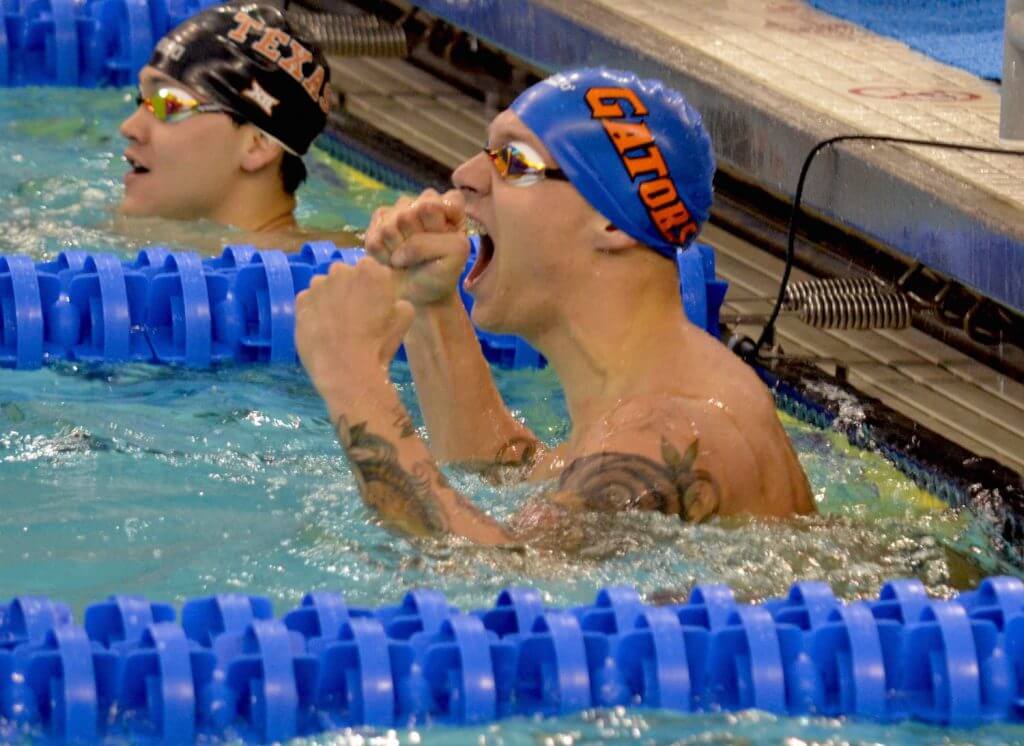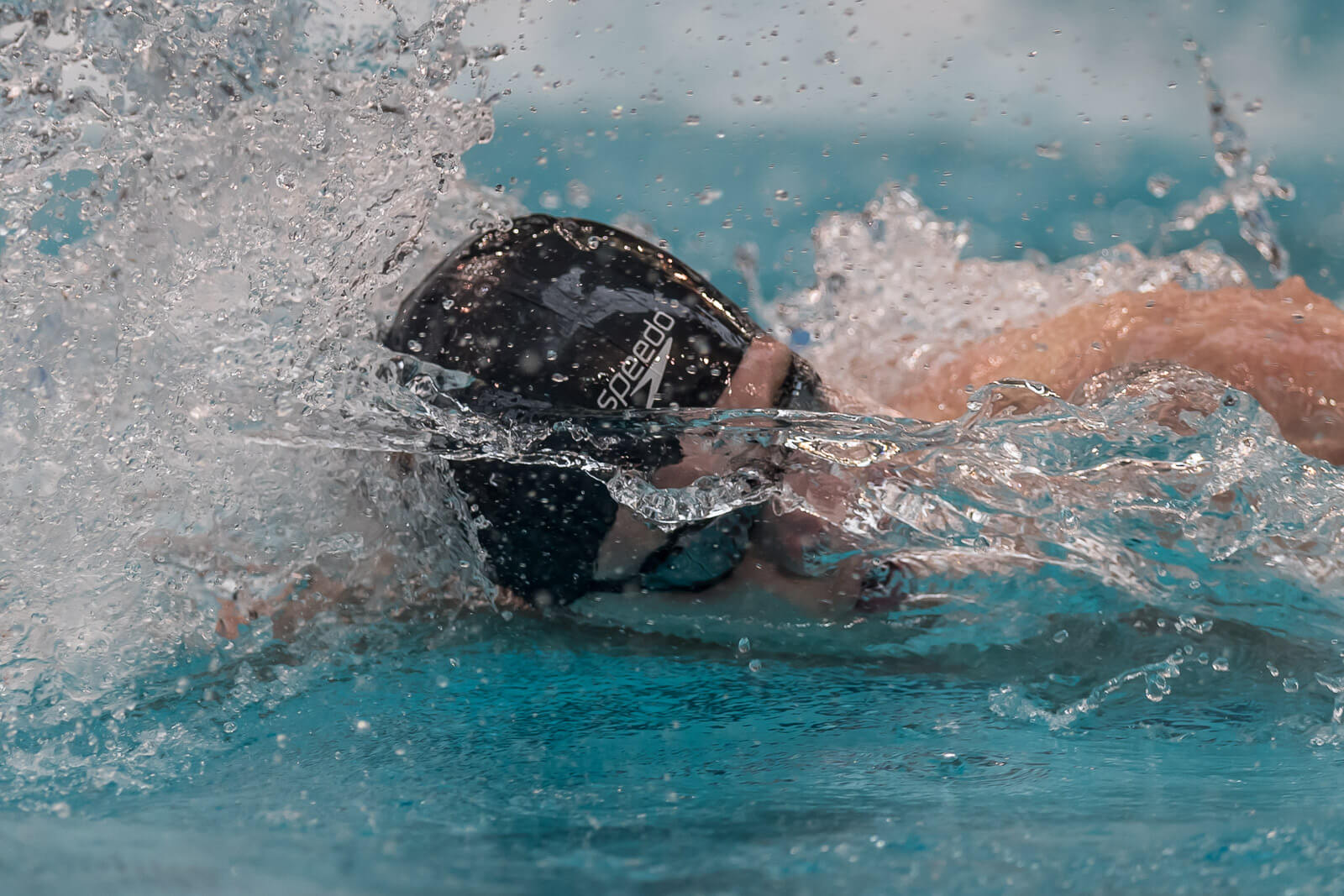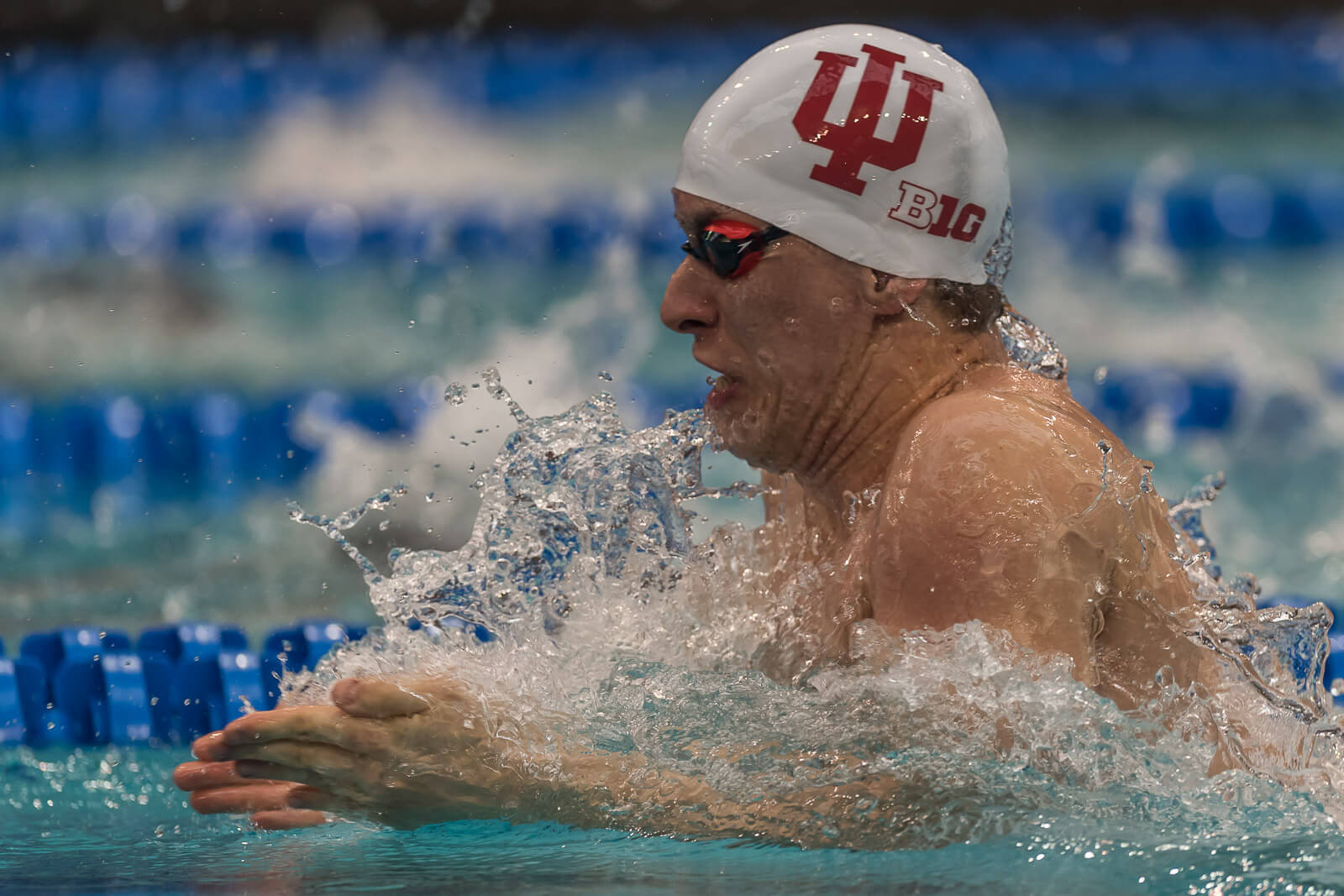Caeleb Dressel Leads Mythical Mashing of Records at NCAA Championships

Editorial content for the 2018 NCAA DI Championship coverage is sponsored by TritonWear. Visit TritonWear.com for more information on our sponsor. For full Swimming World coverage, check event coverage page.
By David Rieder.
In an alternate universe, there was a moment in Minneapolis when breaking records became effortless, when vaunted barriers in the sport of swimming were felled, one after another. It’s a world where man can not only break but crush 18 seconds in the 50 free, 1:30 in the 200 free and 50 seconds in the 100 breast. In that world, perhaps, records cease to exist, with the assumption that however fast one goes, another will surpass it.
NCAA swimming has been transported to that alternate universe. All those following the meet from afar have marveled at the times they have seen, and those of us watching in person barely believe what we’re seeing, either.
The man who started it all has become something of an urban myth. First for Caeleb Dressel were the 50s, the 17.81 relay leadoff and then the 17.63, each simply jaw-dropping. The morning after, his 17.30 anchor leg on Florida’s 4×50 medley relay seemed almost funny—as were the suggestions that, when he anchored the relay in finals, he could possibly split 16.
But before that came his 100 fly, the event in which Dressel shocked Olympic gold medalist Joseph Schooling last season. Back then, when the duo swam respective times of 43.58 and 43.75, it seemed implausible that two men had swum that far under 44 seconds, a barrier that took almost a decade to crack.
Lo and behold, Dressel swam a 42.80. No, that’s not a typo. He just bulldozed right through 43 seconds altogether.
How in the world did he do that?
“I wish I had answers,” Dressel said. “A good quote I’ve learned over the years is, ‘I don’t know.’ I really don’t. I just try to do what I’m told.”
===
Before Dressel’s NCAA championship rampage began, he sat out the Wednesday night session, home to only the 4×200 free relay. In that race, he watched as his Olympic teammate Blake Pieroni laid down a time of 1:29.63 in the 200 free, eight tenths faster than any man had ever swum.
At the 2016 championships, fans seemed almost disappointed when nobody could crack 1:30 or even come close. But after Pieroni got there first, there was one annoyed Olympic gold medalist and two-time defending champion looking for some payback.

Townley Haas — Photo Courtesy: Peter H. Bick
The man most figured would be the first to swim a 1:29 was Townley Haas, who posted a stunning 1:30.46 in the event his freshman year. Haas, too, led off his team’s relay Wednesday night, and he swam a lifetime-best time of 1:30.41—and Pieroni dusted him.
Not this time. Haas determined before the race that he would not be beat to the 100, and if he could get out fast, he figured, no one was going to catch him.
“I think it’s worked out pretty well for me in the past,” Haas said of his strategy. “Before I got in for warm-up, I said. ‘I’m just going to go for it.’ That’s what I did freshman year, and I ended up going 1:30. I decided beforehand that I was going to get out there and hang on. It worked out pretty well.”
Haas flipped at the halfway point in 43.12, and no one was going to catch him. He touched the wall in 1:29.50, seven tenths ahead of Pieroni and fast enough to reclaim the American record for his own.
“I’ve wanted to go under 1:30 since pretty much right after freshman year,” Haas said. “For Blake to do it first, it kind of hit me hard. Obviously it was a great swim. I can’t say anything bad about it—it was incredible. To be able to come back a few days later, have a better swim, better turns, I felt better in the water. It means everything.”
===
Surely, the record purge could take one event off—right? The American and NCAA marks in the 100 breast belonged to, of all people, Dressel. Jumping into an off-event at the SEC championships last month, Dressel clipped the American record with a time of 50.03. The previous mark had belonged to Kevin Cordes, a four-time NCAA champion in the event and an Olympian in his own right.
Cordes spent years stalking the 50-second barrier. Dressel took his one shot. Neither could get there—but Indiana junior Ian Finnerty could. And he smashed it.
In his first two years at Indiana, Finnerty never got to the level of making an impact on a national level as he battled injuries, including three broken ribs his freshman year. But he never stopped striving to be on that elite level, to join the likes of training partners Lilly King and Cody Miller.

Ian Finnerty — Photo Courtesy: Peter H. Bick
“Ian desperately wanted to join it, and Lilly and Cody were trying to help him join it,” Indiana coach Ray Looze said. “They wanted that for him. They’re really, really good kids. It starts with people that trust the process and work hard and are really, really confident and competitive and wants to be one of the world’s best swimmers.”
Finnerty dominated the NCAA final of the 100 breast, and he swam a time of 49.69, more than three tenths faster than Dressel’s record.
“I just do pullouts, so it was super cool to see a breaststroker actually do it,” Dressel quipped.
Unlike Dressel or Haas, Finnerty is not an Olympian or an international medalist, and before this year, he’d never even made an impact on the NCAA level. But in the Friday night record-breaking bonanza, Finnerty had just as central a role as the others.
“It was crazy,” Finnerty said. “Starting out the night with Dressel going under 43, that got everybody excited. The team race is exciting. It’s just helping everybody swim faster, and to be part of it is surreal at this point.”
===
And then, a Dressel encore. Alas, his anchor split on the final relay was merely a 17.37. Pretty incredible that it almost qualifies as a disappointment.
On the meet’s final day, Dressel will take his shot at yet another event where no one stands a chance of beating him: the 100 free. That was the race where, last season, he rocketed to a 40-flat that sent the IUPUI Natatorium into a frenzy.
Oh, but that was before Minneapolis, before records turned into flimsy sticks that seemingly crack with a howl of the wind. Before 17 and 42, before 1:29 and 49.
It’s almost inevitable that Dressel will deliver the first 39-second performance in the 100 free. Some have even suggested that he could swim a 38—and in this new alternate universe, that doesn’t sound so crazy, does it?




.jpg)
First for Caeleb Dresselwere the 50s, the 17.81 relay leadoff and then the 17.63, each simply jaw-dropping. The morning after, his 17.30 anchor leg on Florida’s 4×50 medley relay seemed almost funny—as were the suggestions that that, when he anchored the relay in finals, “16.”
Crazzzzzzzy!!!
Since Caeleb dropped nearly six tenths of a second in the 50 Free, why wouldn’t it be possible for him to drop twice that in a distance twice as long, i.e., drop 1.1 seconds from his 40.0 100 Free best time? I’m expecting a mid-39 at worst and a sub-39 at best!
Wonderful job, David. Makes me feel like I’m there. Thank you.
An amazing talent !
MYTHICAL
MASHING
INDEED
Beyond WOW…!!!
Really fun to watch.